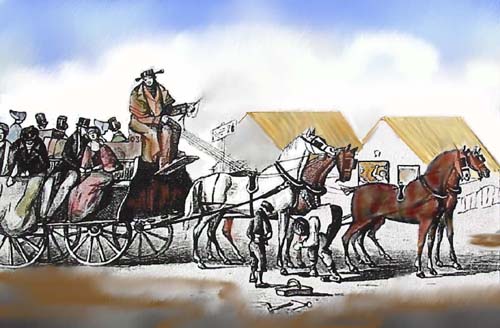| |
|
|
1786-1875
Carlo Bianconi was born in Italy
on 24th September 1786, he was apprenticed to a print maker who took him to Dublin, Charles
as he called himself began selling his employers print while he
traveled the country around Waterford and Wexford.
he was apprenticed to a print maker who took him to Dublin, Charles
as he called himself began selling his employers print while he
traveled the country around Waterford and Wexford.
In 1809 he opened a shop in
Clonmel
County Tipperary selling mirrors, prints and dealing in gold.
The financial decline that followed the end of the Napoleonic war
forced down the price of grain and horses. Bianconi realized it
would be possible to compete with the canals and stagecoaches for
the carriage of passengers.
Bianconi had negotiated a mail
contract with the government and on the 6th July 1815 the first
car (A two wheel cart carrying six passengers back to back, similar
to a jaunting car seen today) made the ten mil journey between Clonmel
and Cahir
in County Tipperary.
Within a year his network covered
most of Tipperary and Wexford, and within twenty years a large part
of the country was traversed by his cars and coaches which had developed
into different sizes.
In 1831 he became a naturalized
British subject, 1844 saw him elected mayor of Clonmel, and in 1846
he bought Longfield a grand country house near Cashel in County
Tipperary.
Bianconi was an astute foreword
thinking businessman, when the railways
began to develop in Ireland he bought shares in various companies,
and timed his cars to connect with the arrival of the trains. He
suffered an accident in 1865 and began selling parts of his company,
he died at Longfield on 22nd September 1875. |
The paragraph below is reprinted
from Samuel Lewis' directory of Ireland
of 1837.
Great facilities of intercourse
throughout the country are afforded by the exertions of Mr. Bianconi,
an intelligent Italian settled at Clonmel, who first established a communication
between Clonmel and Cahir by a jaunting car in 1815, and now has depots
of cars and horses in every post-town in the county, and in all the counties
of Munster except Clare, and of Connaught except Sligo, and in the counties
of Carlow, Kilkenny, King’s, Queen’s, Longford, Westmeath,
and Wexford in Leinster, in which 84 cars, 816 horses, and 469 men are
constantly engaged ; some of them carry the cross mails.
|
|
 he was apprenticed to a print maker who took him to Dublin, Charles
as he called himself began selling his employers print while he
traveled the country around Waterford and Wexford.
he was apprenticed to a print maker who took him to Dublin, Charles
as he called himself began selling his employers print while he
traveled the country around Waterford and Wexford.